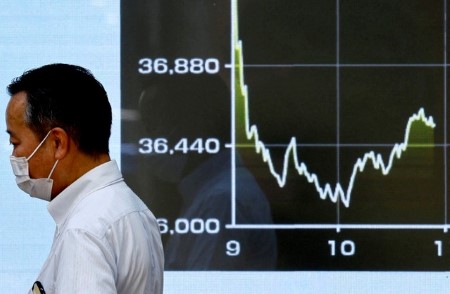




Policy Rate Updates: BSP outlook — cloudy with a chance of rate cut
 DOWNLOAD
DOWNLOAD

January Economic Update: Growth slows, prices rise
 DOWNLOAD
DOWNLOAD

Inflation Update: Up, up, and away?
 DOWNLOAD
DOWNLOAD


Japan’s Nikkei ends lower as court battle over US tariffs weighs

TOKYO – Japan’s Nikkei share price average ended lower on Friday, weighed down by uncertainty surrounding a court battle about US President Donald Trump’s tariffs as well as a stronger yen which hurt exporters.
The Nikkei index fell 1.22% to close at 37,965.1, having ended the previous trading session at its highest point in more than two weeks. It rose 2.17% over the week.
The broader Topix fell 0.37% to 2,801.57 and rose 2.41% for the week.
“Japanese shares rose yesterday on expectations that the impact of Trump’s tariffs on the global economy would be eased, but that positive mood was erased overnight,” said market analyst Shuutarou Yasuda at Tokai Tokyo Intelligence Laboratory.
A federal appeals court temporarily reinstated the most sweeping of Trump’s tariffs on Thursday, a day after a trade court ruled that the president had exceeded his authority in imposing the duties and ordered an immediate block on them.
The US dollar fell following the news, pushing the yen as high as 143.45 on Friday.
Strong inflation data on Friday for Japan’s capital also helped the yen to strengthen, strategists said.
Automakers fell, with Nissan Motor and Honda Motor slipping 3.13% and 1.87%, respectively. Toyota Motor erased early loss to end 1.26% higher.
A stronger yen typically weighs on exporter shares by reducing the value of overseas earnings when converted back into Japanese currency.
Chip-related shares fell, with Advantest and Tokyo Electron down 3.61% and 4.76% respectively, to drag on the Nikkei the most.
Bucking the trend, drugmakers rose, with Otsuka Holdings jumping 6.82% to provide the biggest support for the Nikkei.
Of more than 1,600 stocks trading on the Tokyo Stock Exchange’s prime market, 57% rose, 38% fell and 3% were flat.
(Reporting by Junko Fujita; Editing by Christopher Cushing)
This article originally appeared on reuters.com





 By Reuters
By Reuters